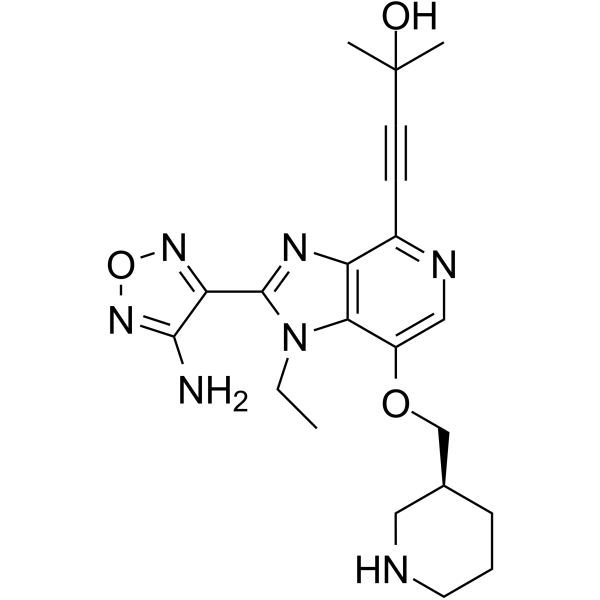Home
Products
GSK690693



| Product Name | GSK690693 |
| Price: | Inquiry |
| Catalog No.: | CN00329 |
| CAS No.: | 937174-76-0 |
| Molecular Formula: | C21H27N7O3 |
| Molecular Weight: | 425.48 g/mol |
| Purity: | >=98% |
| Type of Compound: | Alkaloids |
| Physical Desc.: | Powder |
| Source: | |
| Solvent: | Chloroform, Dichloromethane, Ethyl Acetate, DMSO, Acetone, etc. |
| SMILES: | CCn1c(nc2c1c(OC[C@@H]1CCCNC1)cnc2C#CC(O)(C)C)c1nonc1N |
| Contact us | |
|---|---|
| First Name: | |
| Last Name: | |
| E-mail: | |
| Question: | |
| Description | GSK-690693 is a pan-Akt inhibitor targeting Akt1/2/3 with IC50 of 2/13/9 nM in cell-free assays, also sensitive to the AGC kinase family: PKA, PrkX and PKC isozymes. |
| Target | Akt1:2 nM (IC50) Akt3:9 nM (IC50) Akt2:13 nM (IC50) PKCη:2 nM (IC50) PKCθ:2 nM (IC50) PrkX:5 nM (IC50) PAK6:6 nM (IC50) PAK4:10 nM (IC50) PKCδ:14 nM (IC50) PKCβ1:19 nM (IC50) PKCε:21 nM (IC50) PKA:24 nM (IC50) PKG1β:33 nM (IC50) AMPK:50 nM (IC50) PAK5:52 nM (IC50) DAPK3:81 nM (IC50) Autophagy |
| In Vitro | GSK690693 is very selective for the Akt isoforms versus the majority of kinases in other families. However, GSK690693 is less selective for members of the AGC kinase family including PKA, PrkX, and PKC isozymes with IC50 of 24 nM, 5 nM, and 2-21 nM, respectively. GSK690693 also potently inhibits AMPK and DAPK3 from the CAMK family with IC50 of 50 nM and 81 nM, respectively, and PAK4, 5, and 6 from the STE family with IC50 of 10 nM, 52 nM, and 6 nM, respectively. GSK690693 inhibits the phosphorylation of GSK3β in tumor cells with IC50 ranging from 43 nM to 150 nM. GSK690693 treatment leads to a dose-dependent increase in the nuclear accumulation of the transcription factor FOXO3A. GSK690693 potently inhibits the proliferation of T47D, ZR-75-1, BT474, HCC1954, MDA-MB-453, and LNCaP cells with IC50 of 72 nM, 79 nM, 86 nM, 119 nM, 975 nM, and 147 nM, respectively. GSK690693 treatment induces apoptosis at concentrations > 100 nM in both LNCaP and BT474 cells[1]. Consistent with the role of AKT in cell survival, GSK690693 induces apoptosis in sensitive ALL cell lines[2]. |
| In Vivo | A single administration of GSK690693 inhibits GSK3β phosphorylation in human breast carcinoma (BT474) xenografts in a dose- and time-dependent manner. Similarly, GSK690693 induces a reduction in phosphorylation of the Akt substrates, PRAS40, and FKHR/FKHRL1. GSK690693 also results in an acute increase in blood glucose, returning to baseline 8 to 10 hours after drug administration. Administration of GSK690693 induces reductions in phosphorylated Akt substrates in vivo, and potently inhibits the growth of human SKOV-3 ovarian, LNCaP prostate, and BT474 and HCC-1954 breast carcinoma xenografts, with maximal inhibition of 58% to 75% at the dose of 30 mg/kg/day[1]. GSK690693 exhibits efficacy irrespective of the mechanism of Akt activation involved. GSK690693 is most effective in delaying tumor progression in Lck-MyrAkt2 mice expressing a membrane-bound, constitutively active form of Akt[3]. |
| Cell Assay | Cells are plated at densities that allow untreated cells to grow logarithmically during the course of a 3-day assay. Briefly, cells are plated in 96- or 384-well plates and incubated overnight. Cells are then treated with GSK690693 (ranging from 30 μM-1.5 nM) and incubated for 72 hours. Cell proliferation is measured using the CellTiter Glo reagent. Data are analyzed using the XLFit curve-fitting tool for Microsoft Excel. IC50 values are obtained by fitting data to Eq, 2. |
| Animal Admin | Tumors are initiated by injection of tumor cell suspension (HCC1954, MDA-MB-453, and LNCaP) or tumor fragments (BT474, SKOV-3, and PANC1) s.c. in 8- to 12-wk-old CD1 Swiss Nude mice (LNCaP, SKOV-3, and PANC1) or SCID mice (HCC1954, MDA-MB-453, and BT474). When tumors reach a volume of 100 to 200 mm3, mice are randomized and divided into groups of 8 to 12 mice per group. GSK690693 is administered once daily at 10, 20, and 30 mg/kg by i.p. administration. Animals are euthanized by inhalation of CO2 at the completion of the study. Tumor volume is measured twice weekly by calipers, using the equation: tumor volume (mm3)=(length × width2)/2. Results are reported as % inhibition on day 21 of treatment=100× [1-(average growth of the drug-treated population/average growth of vehicle-treated control population)]. Statistical analysis is done using two-tailed t test. |
| Density | 1.4±0.1 g/cm3 |
| Boiling Point | 683.8±65.0 °C at 760 mmHg |
| Flash Point | 367.3±34.3 °C |
| Exact Mass | 425.217529 |
| PSA | 137.14000 |
| LogP | 4.34 |
| Vapour Pressure | 0.0±2.2 mmHg at 25°C |
| Storage condition | 2-8°C |